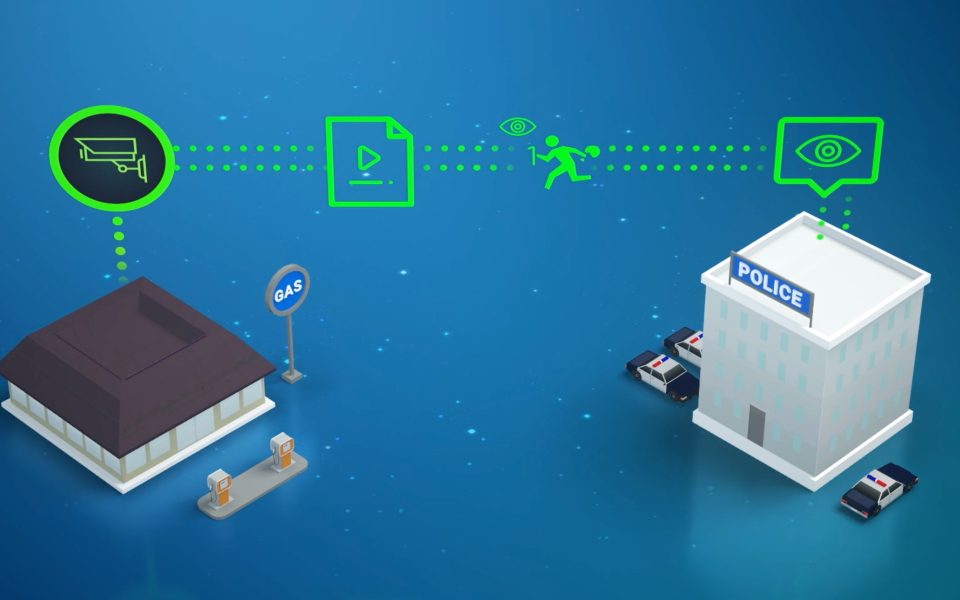Featured photo: The Winston-Salem police department will be able to monitor cameras all throughout downtown in real time should this grant go through. (photo courtesy of Fusus)
Fusus, an Atlanta-based company that uses technology to allow police departments across the country to tap into cameras everywhere, might be coming to Winston-Salem.
The company can access small business cameras that may be monitoring the streets. The Winston-Salem police department recently applied for a Project Safe Neighborhood Grant that would allow them to implement this technology and work with businesses around the city that opt into the new program.
During a public safety committee meeting on Dec. 13, William Penn, the assistant chief for the Winston-Salem Police Department, noted that the $46,000 grant would allow the Winston-Salem Police Department to make two purchases: One is the Core, an electronic device that would stream footage from the area cameras to a real-time crime center and to the police department; the second purchase would be a surveillance kit, which includes the cameras which would be distributed to the businesses that opt into the program. Penn noted that he wasn’t sure how many cameras could be bought with the grant.
“Now, this kit would be possessed by the Winston-Salem Police Department and it would be utilized in publicly visible areas,” Penn siad. “Not in people’s private property. Not anywhere where there would be a legal expectation of privacy. It would be used mobile for us just in those areas that needed that special attention.”
This program specifically would not be using cameras that belong to private civilians, but homeowners are able to register their cameras with the Winston-Salem police department through a separate program.
Winston-Salem Councilmember Kevin Mundy hopes the grant will help with Winston-Salem’s increasing gun violence problem. In 2021, the Gun Violence Archive recorded 165 incidents in the city, significantly more than the 116 incidents recorded in Winston-Salem in 2020, or 103 in 2019.
No other councilmembers commented on the implementation of the tech during the Dec. 13 meeting, but Mundy, who represents the Southwest Ward and is also part of the Public Safety Committee, says protecting downtown is a priority for him.
“That’s an economic driver for us,” Mundy said in the same public safety committee meeting. “We don’t want that to become a dangerous place.”

The Fusus technology is pervasive in cities across the country, like Atlanta and Minneapolis. North Carolina cities using Fusus technology include Asheville, Rocky Mount and Wilmington.
Sahil Merchant, the chief strategy officer for the company, said they often have their cameras in high-traffic areas, like stadiums, but that the cameras can work anywhere. They hook up the individual cameras and then are able to pull them into one platform.
The cameras do not offer facial recognition and owners of the businesses or homes where the cameras are installed can decide when police have access. For example, they can allow police access only in case of an emergency, though the definition of an “emergency” remains vague.
Merchant acknowledged that the public is still hesitant to trust the police, and similar cameras have received backlash.
As Vice reported, cameras like the ones Fusus uses can perpetuate racism by allowing white neighbors to report Black and Brown neighbors for doing almost anything, like just taking a walk around the neighborhood.
Over the past year, several social justice organizations have demanded Amazon scale back their partnerships with police because of privacy concerns.
Due to the backlash, law enforcement officers must request footage through an app as of June 2021. This way, anyone can see what they are requesting. This is not the case with Fusus cameras, although the footage may be accessible through public records requests.
“We haven’t experienced backlash directed at us, but given the civil unrest and bad feeling toward law enforcement, we’re trying to mitigate that with our tech,” Merchant said of Fusus. “We’re giving the ability to have more holistic public safety.”
Merchant claims that since dispatch calls are often vague, Fusus tech can help dispatchers know who to send, whether it be police, healthcare workers or other groups, by seeing what is happening at the scene.
“You don’t want to send all these armed units to two kids fighting in a school,” said Merchant. “Conversely, you don’t want to underestimate an active shooter situation.”
Not everyone in Winston-Salem is excited about the cameras. Bailey Pittenger of the Triad Abolition Project says TAP spoke with the City Council just last year and specifically asked them not to expand police surveillance.
“It will be harmful, just because the surveillance will increase police surveillance and discrimination rather than finding the root of crime,” she said. “The concern is now we’re actually in this phase of expanding surveillance.”
She and other TAP members are encouraging people to listen in on the City Council meetings and voice their concerns.
In fact, Winston-Salem Assistant City Manager Patrice Toney said the reason Penn presented in the public safety meeting in the first place was to give people a chance to voice their concerns. So far, several businesses have expressed interest in being a part of this network.
Toney expects to hear back about whether the city has gotten the grant this month, after which the city will implement the technology as quickly as possible. As of now, Forsyth County is also looking into the same technology.
“People want crime to decrease in the community,” she said. “Everyone wants to live in a safe environment. There’s been no pushback on that.”
Join the First Amendment Society, a membership that goes directly to funding TCB‘s newsroom.
We believe that reporting can save the world.
The TCB First Amendment Society recognizes the vital role of a free, unfettered press with a bundling of local experiences designed to build community, and unique engagements with our newsroom that will help you understand, and shape, local journalism’s critical role in uplifting the people in our cities.
All revenue goes directly into the newsroom as reporters’ salaries and freelance commissions.


Leave a Reply